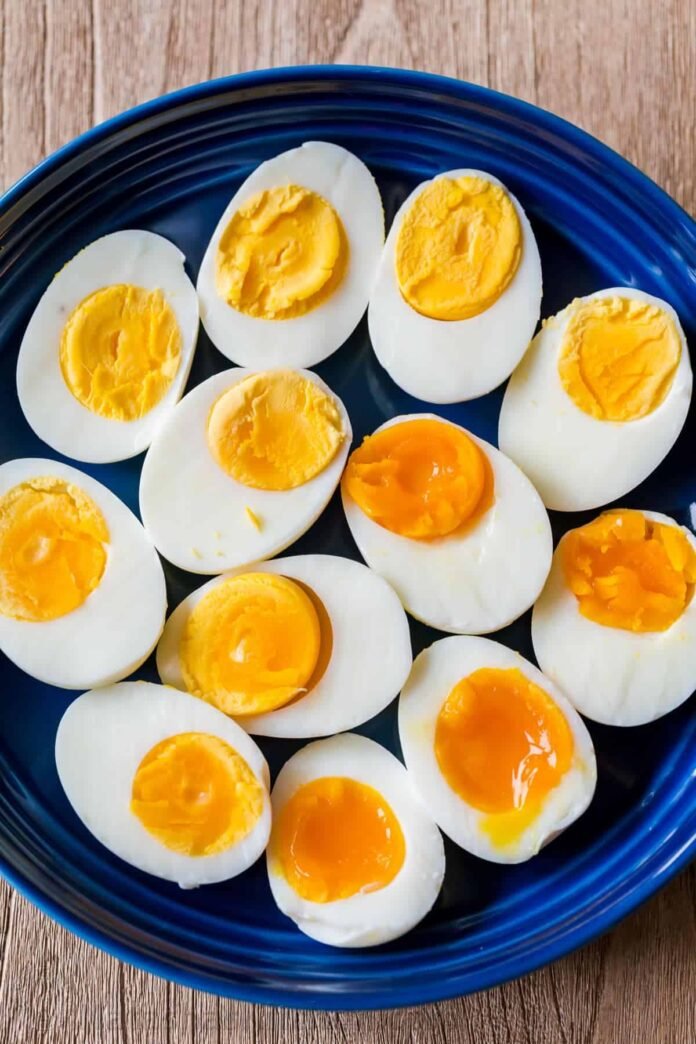How long to boil eggs? It seems simple enough but most people overcook their eggs. Here’s how to make perfect hard-boiled eggs or soft-boiled eggs.
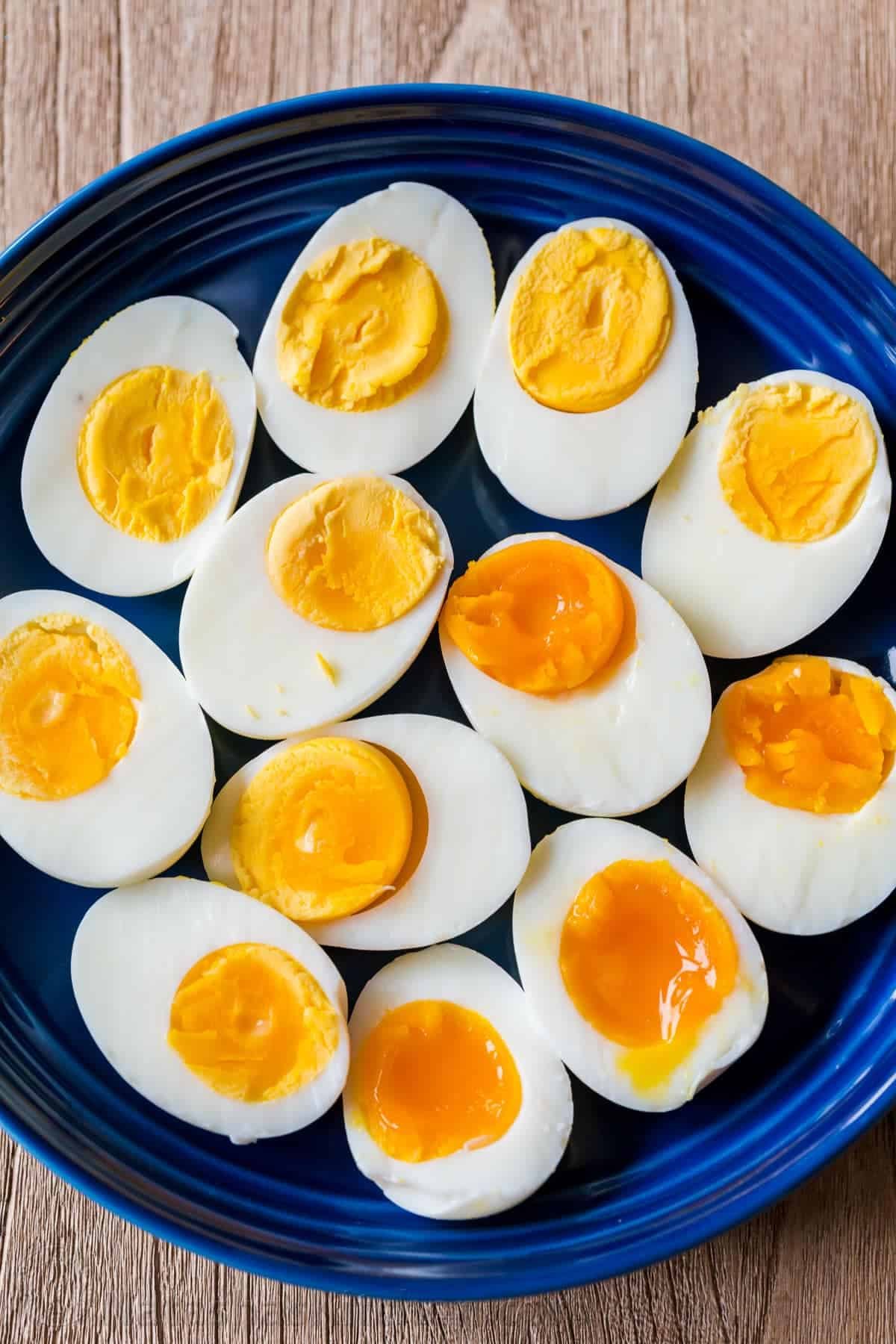
This post may contain affiliate links. Read my disclosure policy.
Perfect Boiled Eggs
Are you tired of overcooked green or grey egg yolks, rubbery whites, or discovering an oozing yolk when you need a firm one for your Chicken Cobb Salad? Do you tend to overcook your eggs just to be sure they are done? This tutorial is for you!
Learn how to make hard-boiled eggs with our tried and true (easy-peel) method. Boiled eggs are such a versatile ingredient and every cook should have this skill down. You will be a pro in no time, enjoying all of your favorite Boiled Egg Recipes, and let’s not forget Easter Eggs.
Hard-Boiled Eggs Video
If you enjoyed this video for How to Make Hard-Boiled Eggs, please subscribe to our Youtube Channel (P.S. Click the BELL icon so you can be the first to know when we post a new video).
Everyone needs a go-to method for perfectly cooked eggs every time for making Deviled Eggs and Egg Salad. This method is really easy – all you need is a saucepan and water.
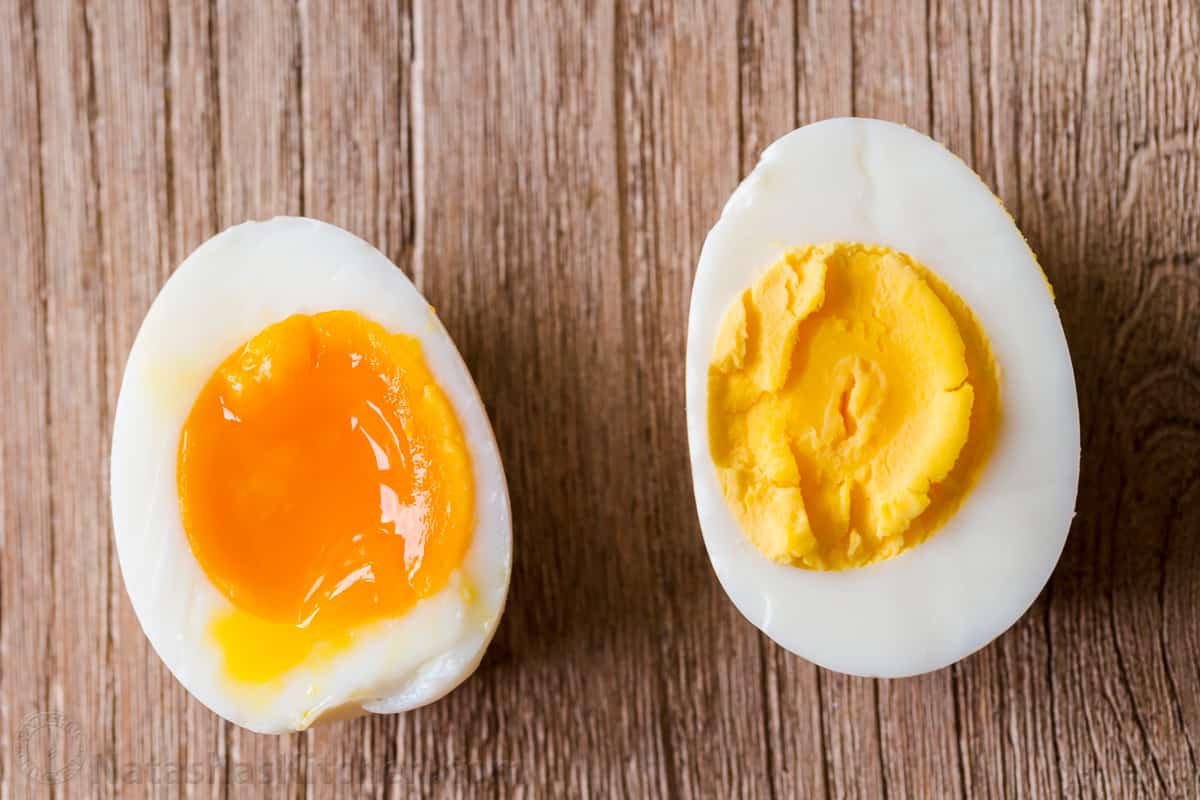
What are the Best Eggs for Boiling?
Eggs come in different sizes (small to jumbo) and varieties (natural, free-range, organic, omega-3, etc). The primary things to consider for boiled eggs are:
- Egg Freshness – Older store-bought eggs are easier to peel. Farm fresh eggs (from backyard chickens) should be cooked under high pressure in the instant pot or they can be very difficult to peel.
- Size Matters – We use Large Grade AA eggs. Large eggs (2 ounces each) are the standard size in most recipes so we stick with those. Medium eggs will cook faster and Extra Large or Jumbo eggs will take a little longer.
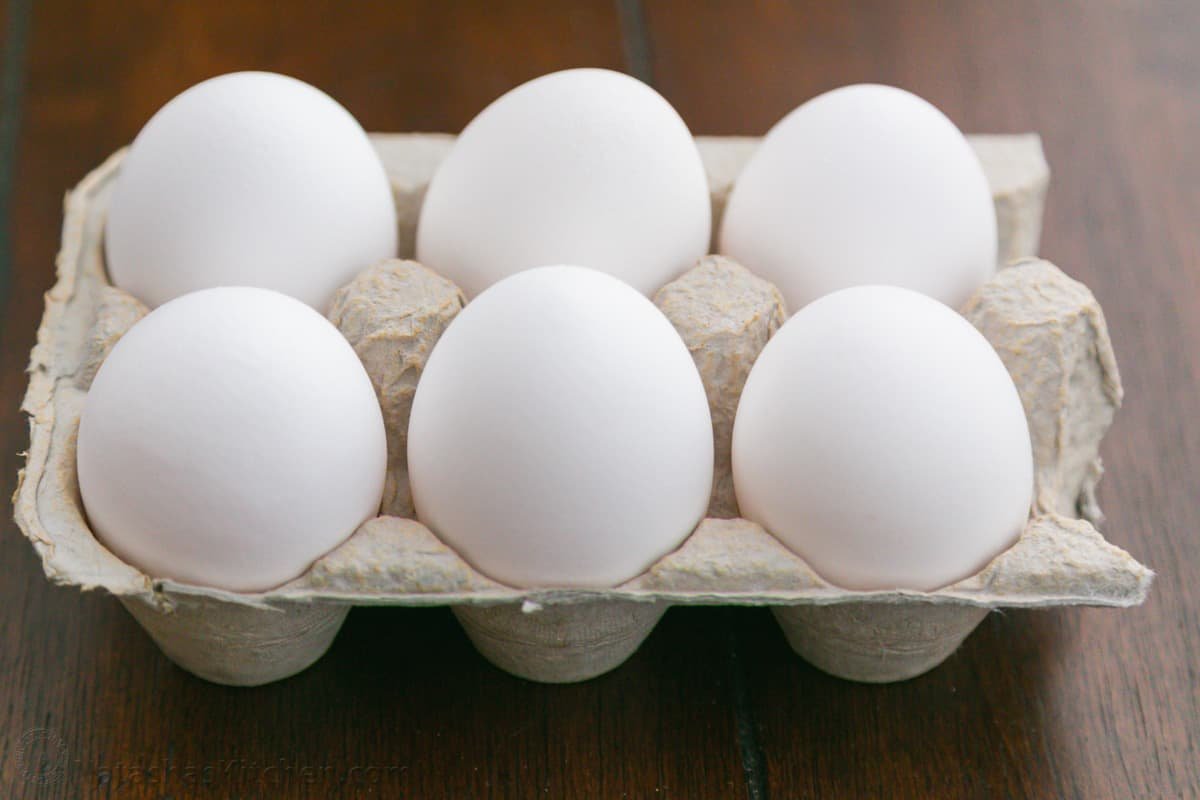
Tips for Perfect Hard Boiled Eggs:
- Use the same pan every time for consistent results. We use a large 3-quart stainless steel saucepan. Different types of pans such as cast iron can take longer to come to a boil which may need less cooking time once eggs are at a boil.
- Don’t cover with the lid or you won’t be able to see when the water starts boiling.
- Set a timer as soon as the water is at a boil (keep watch for the start of the boil so you aren’t guessing at your timings).
- Have a bowl of ice water ready so you can lower your eggs into there as soon as the timer is done. This stops the cooking process and makes them easier to peel.
How to Boil Eggs
- Place cold eggs in a large stainless steel pot and cover with cold water, filling 1″ over the surface of the eggs. Bring to a rolling boil over high heat uncovered.
- Once at a boil, reduce heat to keep a medium boil then set a timer for your desired doneness (see chart below).
- Prepare your ice water bath and as soon as the timer is done, transfer eggs into ice water.
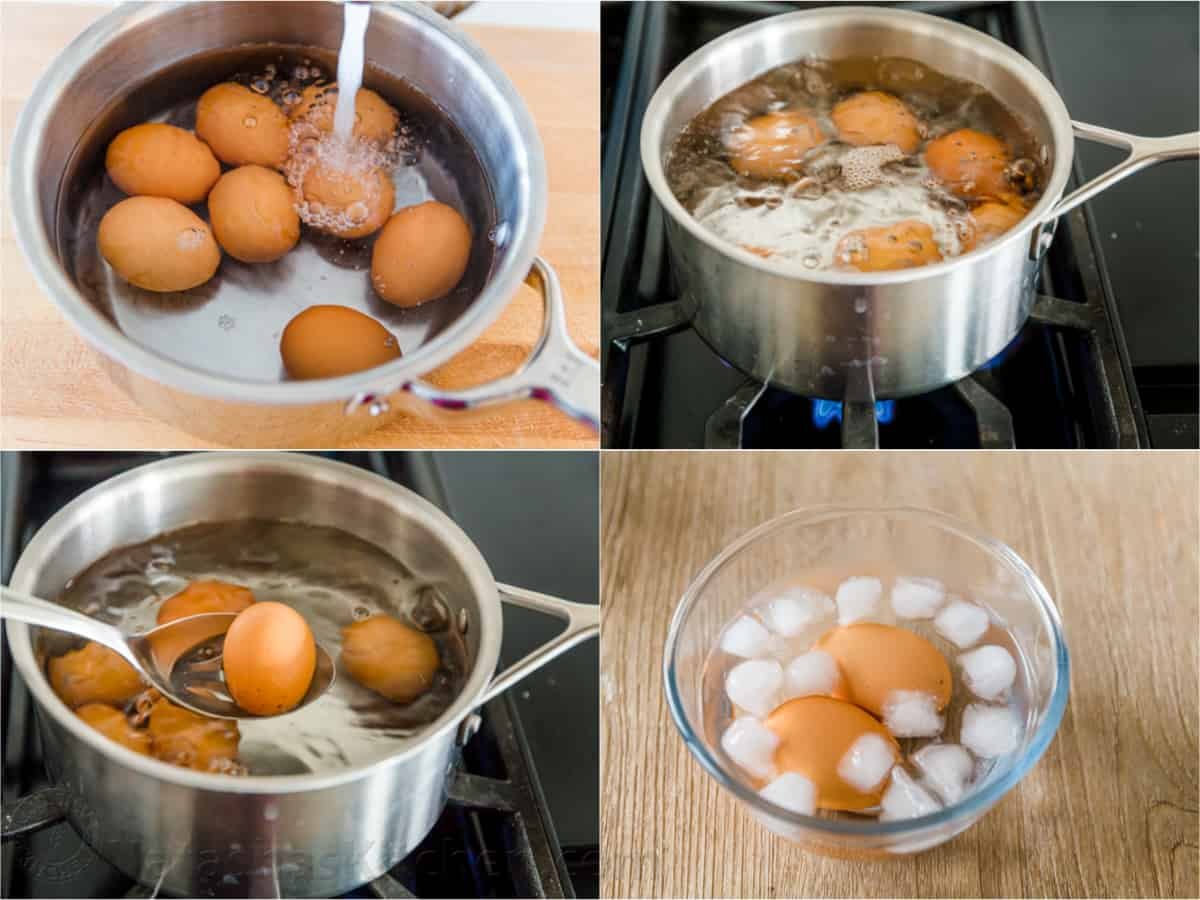
How Long to Boil Eggs Chart
As soon as the water comes to a boil, set your timer and follow this time chart for soft boiled to hard-boiled eggs. Tip: You can pull them out at different times and set up different bowls with ice water to make a variety of eggs all in one pot.
- Boil for 2 minutes: soft boiled with a liquid center
- 3 minutes: soft-boiled with a creamy center
- 4-5 minutes: medium-boiled with a moist, soft center
- 6-7 minutes: hard-boiled eggs with a soft center
- 8-9 minutes – fully hard-boiled eggs with firm, dry center
A perfect hard-boiled egg should have fully set (but not rubbery) whites, have a bright yellow center, and should never have a green tinge around the yolk which signifies overcooking. Soft-boiled eggs have fully set whites and a creamy liquid center.
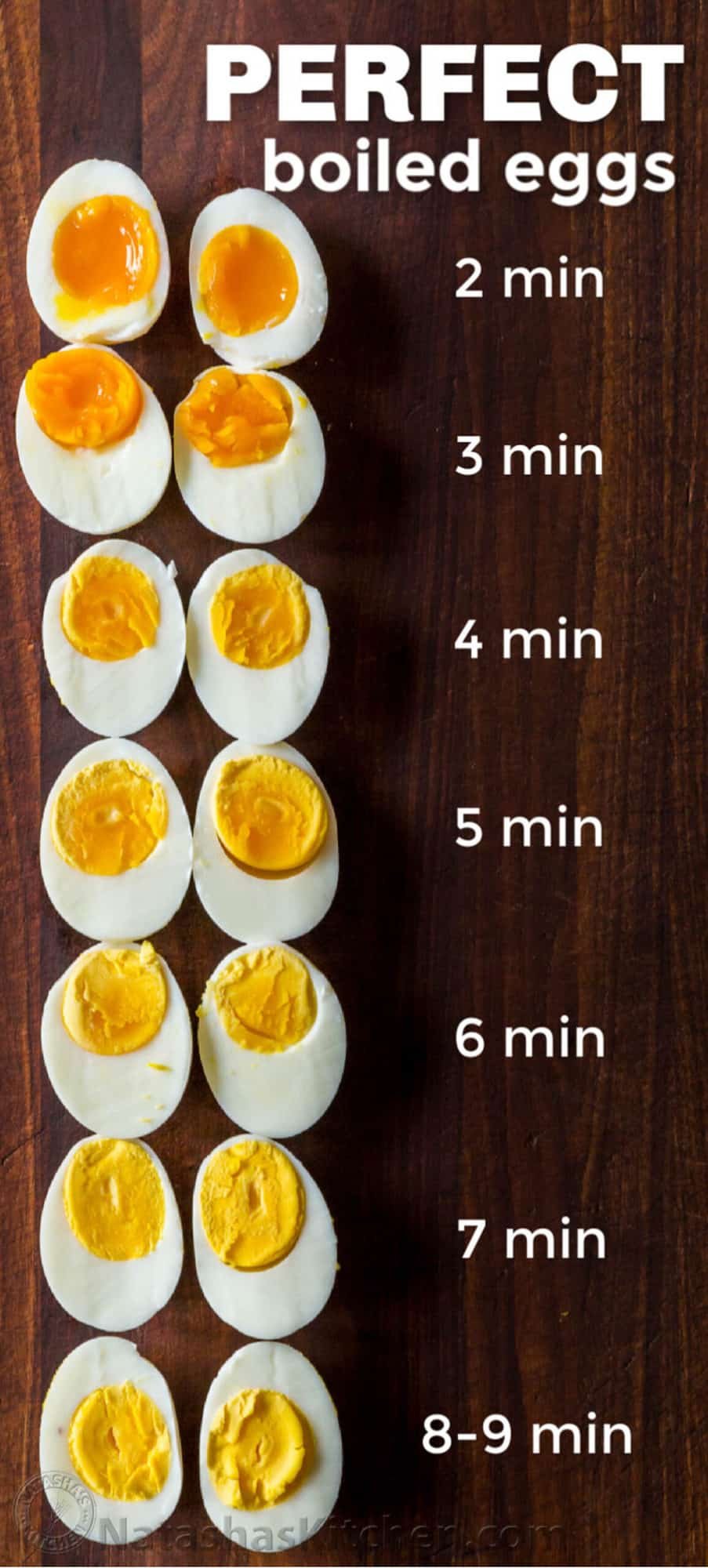
Do I need to add salt or vinegar for Boiled Eggs?
It is thought that adding vinegar to the water helps with easier peeling of eggs, but the difference is minimal so it’s optional. Adding salt to the water is also optional but it can help if you have a cracked egg to reduce the amount of egg white that leaks into the water. It can help form a small seal on small cracks.
Helpful Reader Review
“Great method. I have a terrible habit of overcooking eggs and this is a super helpful chart. I had a thought about the salt, though. I learned in my college cooking courses that salt in the water will stop cracked eggs from leaking egg into the water. Sometimes eggs will crack a little bit when the water really gets roiling and the salt helps keep the egg inside the shell.” – Betsy ★★★★★
What is the best way to peel eggs?
Start peeling at the thick end of the egg where the air bubble is located to get under the membrane for easy shell removal. Also, peeling eggs under running cold water forces water under the membrane for easier shell removal.
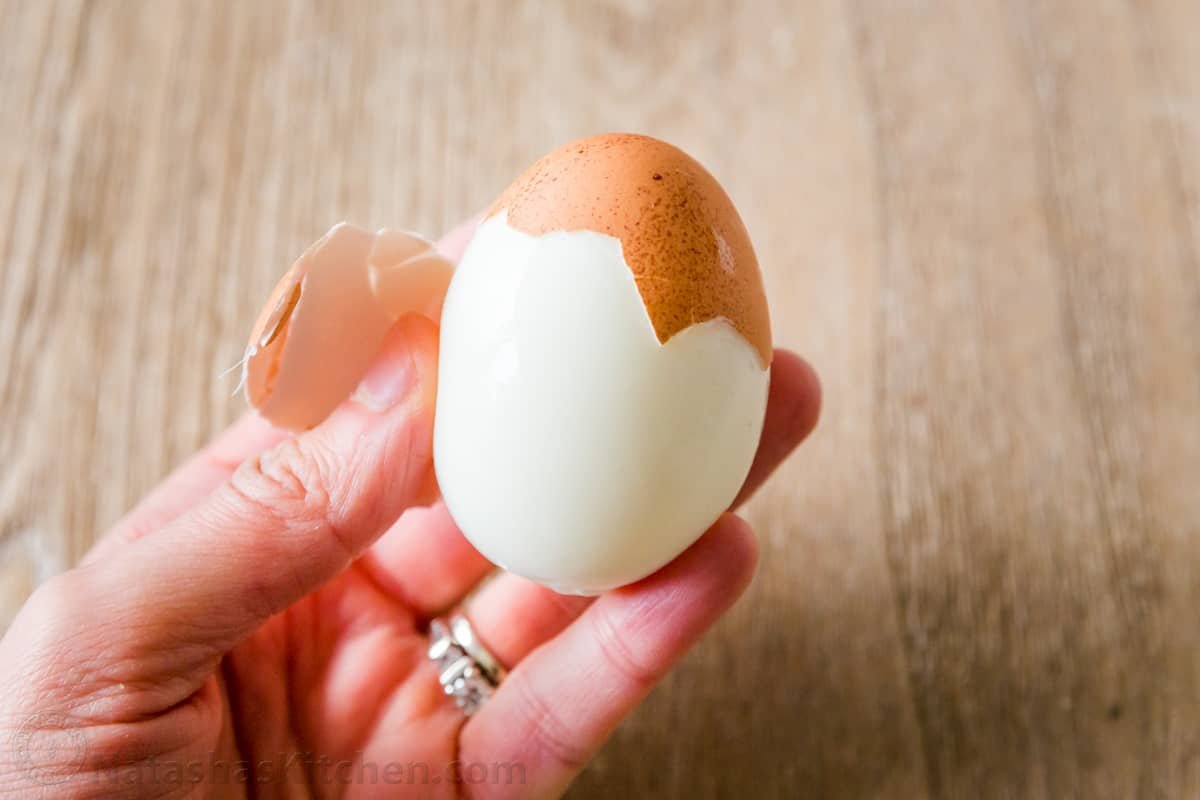
How to Store Hard-Boiled Eggs
According to the USDA, boiled eggs should be refrigerated within 2 hours of cooking. The length of time you can store them depends on if they are hard-boiled versus soft-boiled:
- Hard-boiled eggs will keep well in the fridge for up to 7 days. Keep them unpeeled to prevent order absorption and drying out. If peeled, store them in an airtight container.
- Soft-boiled eggs can be kept refrigerated for up to 3 days, peeled, or unpeeled in an airtight container.
How to Use Hard-Boiled Eggs
Hard-cooked eggs are so versatile and good for you. Here are our favorite ways to use boiled eggs:
How to Make Hard Boiled Eggs Recipe
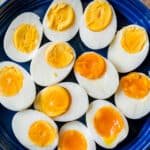
This method for making hard-boiled eggs (or soft boiled eggs) will get you perfect results every time and it’s really easy!
Prevent your screen from going dark
-
Place cold eggs in a large 3-quart stainless steel saucepan and cover with cold water so water is 1″ above the surface of the eggs. With the lid off, bring to a rolling boil over high heat.
-
Once at a boil, reduce heat to keep at a medium boil and set a timer for your desired doneness (see chart below).
-
Prepare your ice water bath, and as soon as the timer is done, transfer the eggs into ice water so they are fully submerged. Once the eggs have cooled, you can refrigerate hard-boiled eggs for up to 7 days or soft-boiled eggs for up to 3 days. Peel when ready to use.
- Boil 2 min: soft boiled with a liquid center
- Boil 3 min: soft-boiled with a creamy center
- Boil 4-5 min: medium-boiled with a moist, soft center
- Boil 6-7 min: hard-boiled eggs with a soft center
- Boil 8-9 min: hard-boiled eggs with firm dry center
63kcal Calories1g Carbs6g Protein4g Fat
Nutrition Facts
How to Make Hard Boiled Eggs Recipe
Amount per Serving
% Daily Value*
* Percent Daily Values are based on a 2000 calorie diet.

